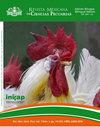Adenocarcinoma pulmonar ovino en México
IF 0.6
4区 农林科学
Q3 AGRICULTURE, DAIRY & ANIMAL SCIENCE
引用次数: 0
Abstract
Ovine pulmonary adenocarcinoma is a transmissible pulmonary malignancy of sheep caused by a beta-retrovirus currently named Jaagsiekte sheep retrovirus (JSRV). Club cells (formerly Clara cells) in the bronchiole and type II pneumonocytes in the alveoli are the target oncogenic cells for this virus. Characterized clinically by intermittent cough, abundant nasal discharge, and progressive weight loss, the tumors randomly involve all lung lobes or have a cranioventral distribution mimicking bronchopneumonia. The definitive diagnosis of ovine pulmonary adenocarcinoma requires identifying Jaagsiekte sheep retrovirus or associated specific proteins in neoplastic cells such as JSRV-Env oncogenic protein. A two-year-old Male Pelibuey sheep with a history of chronic cough and progressive weight loss was treated unsuccessfully with antibiotics and died a few days later. Postmortem examination revealed lung edema and several nodular to locally extensive masses in the lungs. Microscopically the tumoral tissues were composed of clusters of neoplastic epithelial cells exhibiting a lepidic growth pattern typical of pulmonary carcinoma. Tumoral cells were immunopositive for Jaagsiekte sheep retrovirus-Env oncogenic protein. Based on these findings, the final diagnosis of ovine pulmonary adenocarcinoma was made.墨西哥羊肺腺癌
绵羊肺腺癌是绵羊的一种传染性肺部恶性肿瘤,由一种β -逆转录病毒引起,目前被称为羊Jaagsiekte逆转录病毒(JSRV)。细支气管中的俱乐部细胞(以前称为Clara细胞)和肺泡中的II型肺细胞是该病毒的靶致瘤细胞。临床表现为间歇性咳嗽、大量鼻分泌物和进行性体重减轻,肿瘤随机累及所有肺叶或具有类似支气管肺炎的颅腹侧分布。绵羊肺腺癌的明确诊断需要鉴定羊Jaagsiekte逆转录病毒或肿瘤细胞中相关的特异性蛋白,如JSRV-Env致癌蛋白。一只两岁的雄性Pelibuey羊有慢性咳嗽和进行性体重减轻的病史,用抗生素治疗无效,几天后死亡。尸检显示肺水肿和几个结节到局部广泛的肿块。显微镜下,肿瘤组织由肿瘤上皮细胞簇组成,呈典型肺癌的鳞状生长模式。肿瘤细胞对羊Jaagsiekte逆转录病毒- env致癌蛋白免疫阳性。根据这些结果,最终诊断为羊肺腺癌。
本文章由计算机程序翻译,如有差异,请以英文原文为准。
求助全文
约1分钟内获得全文
求助全文
来源期刊

Revista Mexicana de Ciencias Pecuarias
AGRICULTURE, DAIRY & ANIMAL SCIENCE-
CiteScore
1.20
自引率
0.00%
发文量
93
审稿时长
>12 weeks
期刊介绍:
The MEXICAN MAGAZINE OF SCIENCES PECUARIAS is an organ of scientific and technical diffusion of the livestock sector. Its periodicity is quarterly and arbitrated by pairs in the double-blind mode. Its objective is to make known the results of the research carried out by any scientific institution, in Mexico and in any part of the world, related to the livestock sciences, particularly those that refer to the different disciplines of Veterinary Medicine and Animal Science. The Journal is bilingual, publishes the complete articles in Spanish or English and is included in various indexing services and international dissemination platforms, such as the Index of Mexican Journals of Scientific and Technological Research of the National Council of Science and Technology (CONACYT); In the EBSCO Host database; In the Network of Scientific Journals of Latin America and the Caribbean, Spain and Portugal (RedALyC); In the Ibero-American Network of Scientific Journals of Free Access Veterinary Medicine. Indexed in the ISI Journal Citation Report Science Edition; And Elsevier''s SCOPUS and EMBASE indices.
 求助内容:
求助内容: 应助结果提醒方式:
应助结果提醒方式:


